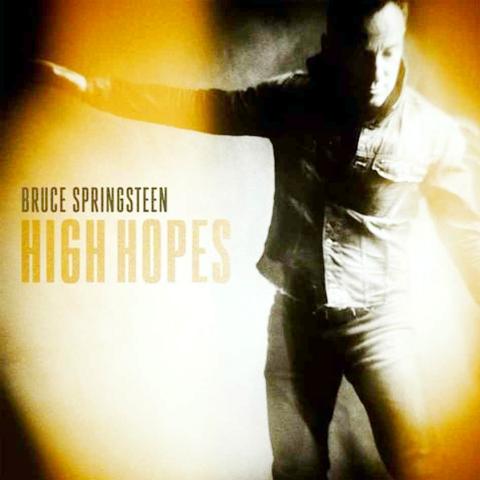High Hopes, by Bruce Springsteen
The title track of the new Bruce Springsteen album is his second recorded shot (this time with Tom Morello, once of Rage Against the Machine, as his temporary lead guitarist) at a version of a certain sort of updated work song by a now-defunct, post-rockabilly, looking-for-the-lost-spirit-of-America band called the Havalinas.
You will notice a lot of ghost chasing in that sentence. One of the tracks here, maybe even the best — an orchestral waltz detailing the Buddhism of low expectations — is called Hunter of Invisible Game. What a perfect title that would have been for this record.

This is a chunk of studio material from the last decade that was never released (including a posthumous appearance by saxophonist Clarence Clemons on Harry’s Place), with some added parts; songs that were already recorded but are here revived and retouched; and covers of other songwriters’ work. You sense that Springsteen is, in some way, thanking these songs, or paying respect to their power over his audience: He’s doing so by giving them an official recorded version. The best of them — mostly the resigned or farseeing songs, the songs that have no hero and no story — rise above the odds. But a large portion of the record feels, let’s say, official.
It’s not scattershot. It has sufficient unity of instrumentation and postproduction mastering. It’s an album of nearly symphonic roots-rock and selected extras — accordion, uilleann pipes, gospel choruses — to get close to other forms and visions, and then some temporary downshifts into sparer and less narrative modes.
It also has Morello as added value, and sometimes it’s his job to distinguish a track, to add grain or spark to it. His distortion, wah-wah and digital whammy effects open up broad, loud holes in a few songs — especially the gospel-ish Heaven’s Wall and the redo of Springsteen’s The Ghost of Tom Joad — to the point where you feel that Springsteen has yielded control. This isn’t a very good thing, unless you are here to learn guitar technique from Morello.

The record ends with Dream Baby Dream, an unblinking stare of a love song. It was recorded in 1979 by Suicide, and Springsteen used it to close his 2005 solo tour, playing harmonium and singing with a jarring echo. Those versions, which you can easily enough hear online, really make their point: Springsteen goes somewhere with the song, through repetition, intensity, even small failures of pitch. The official version here, with strummed guitar, orchestra and a soft rhythm track suitable for yoga, expands it, defangs it and fuzzes up its purpose. Oh, well.
— Ben Ratliff, NY Times News Service
That Girl, by Jennifer Nettles
The four-word phrase that’s fast becoming a four-letter word in pop music is “produced by Rick Rubin.” The eminence-grise phase of Rubin’s career began with projects — Johnny Cash, Red Hot Chili Peppers — in which he distilled complex artists to hard, essential cores. He became the legend whisperer. Last year, Kanye West benefited from Rubin’s trademark gifts of reduction, but West was a maximalist in search of severity, a talent that could meet Rubin at eye level, or above.
Generally, though, those who make the trek out to Rubin’s Shangri-La Studio, in Malibu, California, are supplicants: They want something from Rubin they don’t find in themselves. For a great but unimaginative singer like Jennifer Nettles, frontwoman of the genial and sometimes ambitious country outfit Sugarland, securing Rubin to produce her solo debut album, That Girl, is a loud plea to be taken seriously, a coup and also a waste of energy. Sure, Rubin may attempt to boil her down to her essence, but he may or may not find anything there.
At minimum, That Girl does work that Sugarland albums, strong as they sometimes have been, never could. Sugarland excels at two things: goofy rural charm and blunt-force melodrama, though it’s the lighthearted side that truly sets it apart from the rest of Nashville.
On her own, Nettles is free to chase her muse, which may not be a more exciting, or more challenging, prospect than what she’s been doing for a decade.
On this always pleasant and occasionally more-than-that album, the chase leads her to a couple of songs (This Angel, about a newborn, and Thank You) delivered with Christian-rock restraint, and also to This One’s for You, written by Nettles with Sara Bareilles, perhaps for a Carole King-impression competition. (Nettles has a writing credit on every track but one.)
On a couple of songs, Moneyball and the surprisingly rowdy Know You Wanna Know, Nettles sings about the modern world as if her lyrics were written by a random-word generator. There is also a breathy cover of Bob Seger & the Silver Bullet Band’s Like a Rock that imbues the song with soft intensity and is also conveniently a cover of a song that was used as a Chevrolet commercial anthem for more than a decade.
Only rarely does this album capture Nettles’ remarkable voice, a twang-thick burr with real soul-music depth. It flutters beautifully on Falling and gets winningly raspy on the end of the title track. But she never truly lets it loose. Perhaps she believes quiet is her real milieu.
What might have led her to think that was Stay, one of the signature Sugarland hits, an asphyxiating song sung from a woman to the man who’s cheating on his partner to be with her. On that 2006 song, easily the most striking in the Sugarland catalog, Nettles showed all her shades.
Judging by the best parts of That Girl, infidelity might be Nettles’ real muse. On Know You Wanna Know, she tosses off cheeky tabloid gossip: “His wife has a baby on the way/Friends all said he had it made/Gave it all up for a hussy country singer.” Jealousy, a sprightly lite-soul number, is full of hilarious confessions about turning green:
Showing up at your house, half drunk and crazy
Bitch, I called you out
Or at that party where I made such a mess
And poured my whiskey down the back of your dress.
But it’s the outstanding title track that suggests Nettles is animated by love triangles maybe more than anything else. A peppy blues song written with Butch Walker, it’s the antidote to Stay, and the song on which moral conscience comes in and stops bad behavior before it spirals out of control:
I knew he was good-looking
Maybe too good to be true
But when he kissed me in that alley
I could tell there was a you.
— Jon Caramanica, NY Times News Service

April 28 to May 4 During the Japanese colonial era, a city’s “first” high school typically served Japanese students, while Taiwanese attended the “second” high school. Only in Taichung was this reversed. That’s because when Taichung First High School opened its doors on May 1, 1915 to serve Taiwanese students who were previously barred from secondary education, it was the only high school in town. Former principal Hideo Azukisawa threatened to quit when the government in 1922 attempted to transfer the “first” designation to a new local high school for Japanese students, leading to this unusual situation. Prior to the Taichung First

The Ministry of Education last month proposed a nationwide ban on mobile devices in schools, aiming to curb concerns over student phone addiction. Under the revised regulation, which will take effect in August, teachers and schools will be required to collect mobile devices — including phones, laptops and wearables devices — for safekeeping during school hours, unless they are being used for educational purposes. For Chang Fong-ching (張鳳琴), the ban will have a positive impact. “It’s a good move,” says the professor in the department of

On April 17, Chinese Nationalist Party (KMT) Chairman Eric Chu (朱立倫) launched a bold campaign to revive and revitalize the KMT base by calling for an impromptu rally at the Taipei prosecutor’s offices to protest recent arrests of KMT recall campaigners over allegations of forgery and fraud involving signatures of dead voters. The protest had no time to apply for permits and was illegal, but that played into the sense of opposition grievance at alleged weaponization of the judiciary by the Democratic Progressive Party (DPP) to “annihilate” the opposition parties. Blamed for faltering recall campaigns and faced with a KMT chair

Article 2 of the Additional Articles of the Constitution of the Republic of China (中華民國憲法增修條文) stipulates that upon a vote of no confidence in the premier, the president can dissolve the legislature within 10 days. If the legislature is dissolved, a new legislative election must be held within 60 days, and the legislators’ terms will then be reckoned from that election. Two weeks ago Taipei Mayor Chiang Wan-an (蔣萬安) of the Chinese Nationalist Party (KMT) proposed that the legislature hold a vote of no confidence in the premier and dare the president to dissolve the legislature. The legislature is currently controlled